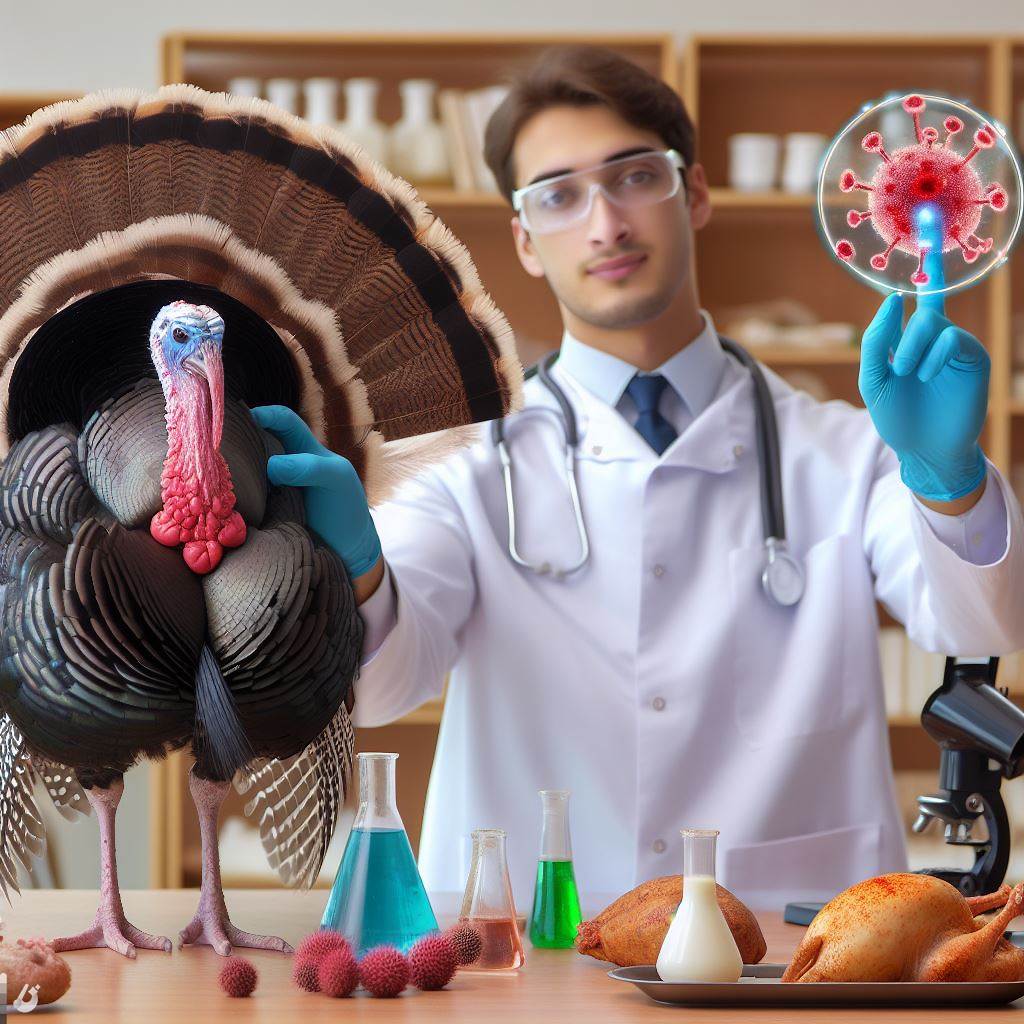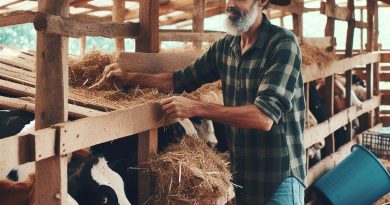Turkey Health: Preventing Flock Diseases
Last Updated on January 22, 2024
Introduction
Importance of maintaining turkey flock health
Turkeys play a significant role in the poultry industry, providing meat and eggs for consumption worldwide.
To ensure their overall well-being and productivity, it is essential to maintain the health of turkey flocks.
This blog section will discuss the importance of maintaining turkey flock health and provide an overview of common diseases that can affect turkey flocks.
Maintaining the health of turkey flocks is crucial for several reasons.
Firstly, healthy turkeys are more likely to have better growth rates and higher meat quality, which is vital for the profitability of the poultry industry.
Secondly, preventing diseases helps minimize the need for antibiotics and other medications, reducing the risk of antibiotic resistance.
Additionally, disease outbreaks can have devastating effects on turkey flocks, leading to significant economic losses for farmers.
Overview of common diseases that can affect turkey flocks
Several diseases can affect turkey flocks.
These include respiratory diseases such as infectious bronchitis and avian influenza, as well as digestive diseases like coccidiosis and blackhead.
Other common diseases include turkey viral enteritis, histomoniasis, and infectious bursal disease.
Each disease presents unique challenges and requires specific preventive measures.
By implementing proper biosecurity practices, such as controlling access to the farm, disinfecting equipment, and monitoring flock health, farmers can reduce the risk of disease transmission.
Vaccinations can also play a crucial role in preventing diseases and boosting the immune system of turkey flocks.
Theerefore, maintaining the health of turkey flocks is of utmost importance in the poultry industry.
By understanding common diseases and implementing preventive measures, farmers can protect their flocks, ensure better productivity, and contribute to a sustainable turkey industry.
Read: Beekeeping Health: Hive Disease Prevention
Understanding turkey flock diseases
Definition and types of flock diseases
Flock diseases refer to illnesses that can affect a group of turkeys in a poultry farm.
Types of flock diseases include respiratory infections, digestive disorders, and viral or bacterial infections.
Causes and modes of transmission
Flock diseases can be caused by viruses, bacteria, parasites, or environmental factors.
Transmission can occur through direct contact, contaminated water or feed, or airborne particles.
Impact on turkey production and profitability
Flock diseases pose complex challenges for turkey farmers, impacting growth, production, and profitability.
A decline in growth rates and weight gain is a direct consequence of these diseases, significantly affecting the overall health of turkey flocks.
Additionally, infected turkeys experience reduced egg production, leading to a tangible decrease in profitability for farmers.
Moreover, flock diseases contribute to increased mortality rates, ultimately diminishing the size of turkey flocks.
The necessity for veterinary intervention and medication in response to these diseases introduces additional financial burdens for turkey farmers.
Outbreaks of flock diseases trigger quarantine measures, restricting the movement of turkeys and causing disruptions in the supply chain.
This disruption, in turn, may lead to substantial financial losses for turkey producers.
The ramifications extend to consumer trust, as flock diseases can erode confidence in turkey products.
Perceived risks may prompt consumers to switch to alternative protein sources, thereby reducing the demand for turkey.
To counter these challenges, turkey farmers must prioritize disease prevention strategies, including regular vaccination, biosecurity measures, and proper waste management.
Additionally, maintaining a clean environment through proper ventilation, regular disinfection, and ensuring water and feed quality is crucial.
Monitoring turkey health through regular check-ups and diagnostic testing, coupled with early detection and containment of diseases, plays a pivotal role in sustaining the health and profitability of turkey flocks.
Collaborating with veterinarians and sharing knowledge among farmers further contributes to overall flock health improvement.
Therefore, understanding the intricacies of flock diseases is imperative for implementing effective prevention strategies and ensuring the overall well-being and profitability of turkey farming operations.
Read: Deer Farming: Managing Health & Disease

Preventive measures for maintaining turkey flock health
Biosecurity practices
These preventive measures are essential for maintaining the overall health and well-being of turkey flocks.
By implementing strict biosecurity practices, such as controlling farm access and adhering to quarantine protocols, the risk of disease spread can be significantly reduced.
Regular cleaning and disinfection procedures should also be carried out to eliminate potential pathogens that may affect the flock.
Additionally, monitoring and controlling visitor movements can prevent the introduction of diseases from external sources.
Vaccination programs
Vaccination programs play a crucial role in preventing flock diseases.
Understanding the importance of vaccines and following the recommended vaccination schedule for turkeys is vital for ensuring maximum protection against various pathogens.
By vaccinating the flock, the immune system of turkeys can be strengthened, reducing the risk of disease outbreaks.
Nutrition and proper flock management
Proper nutrition and flock management are also key factors in maintaining turkey flock health.
Providing a balanced diet and following appropriate feeding practices are essential for supporting the immune system and overall health of turkeys.
Proper housing and ventilation are equally important, as they contribute to creating a healthy environment for the flock.
Implementing stress management techniques, such as minimizing overcrowding and reducing environmental stressors, can help prevent the negative impacts of stress on turkey health.
Early detection and monitoring
Early detection and monitoring are crucial in preventing the spread of diseases within turkey flocks.
Regular health checks and observations should be conducted to identify any signs of illness or abnormal behavior.
If any concerns arise, laboratory testing and diagnostic procedures can be used to confirm and diagnose potential diseases.
Prompt action and appropriate treatment can then be taken to prevent further spreading and minimize the impact on the flock’s health.
Most importantly, implementing preventive measures for maintaining turkey flock health is of utmost importance.
Strict biosecurity practices, vaccination programs, proper nutrition and flock management, as well as early detection and monitoring, are all essential components in ensuring the well-being and disease-free status of turkey flocks.
By following these measures diligently, turkey farmers can effectively prevent flock diseases and ensure the overall health and productivity of their flocks.
Read: Innovative Poultry Housing Solutions in 2024
Common turkey flock diseases and their prevention
Avian Influenza
Transmission methods and prevention strategies
Avian Influenza can spread through direct contact with infected birds, contaminated equipment, or contaminated surfaces.
It is crucial to implement strict biosecurity measures to prevent the introduction and spread of the disease.
Infectious Bursal Disease (IBD)
Symptoms and impact on turkey flocks
IBD can cause immunosuppression and may lead to increased susceptibility to other diseases, slower growth, and decreased egg production.
Symptoms include depression, diarrhea, and increased mortality.
Vaccination options and recommendations
Vaccination is an effective tool to prevent IBD.
Consult with a veterinarian to determine the most suitable vaccine and vaccination program for your turkey flock.
Blackhead Disease
Understanding the parasite responsible and prevention measures
Blackhead Disease, caused by the protozoan parasite Histomonas meleagridis, can be transmitted through contaminated drinking water, feces, or direct contact with infected birds.
Preventive measures include maintaining good hygiene and controlling intermediate hosts like earthworms.
Erysipelas
Symptoms and methods of transmission
Erysipelas can cause sudden death, swollen joints, skin discoloration, and decreased feed consumption.
It is transmitted through the ingestion of contaminated feed or water, or direct contact with infected birds.
Treatment and prevention strategies
Prompt antibiotic treatment is necessary for affected birds.
To prevent erysipelas, practice good biosecurity, maintain cleanliness, and provide a balanced diet to strengthen the turkey’s immune system.
In essence, preventing flock diseases is crucial for the health and productivity of turkey flocks.
Implementing strict biosecurity measures, considering vaccination options, and understanding the transmission and prevention strategies for various diseases are essential components of a comprehensive flock health management program.
Regular consultations with veterinarians and continuous monitoring of flock health are key to maintaining disease-free turkey flocks.
Read: Optimal Nutrition for Chickens & Turkeys
Conclusion
Recap of key points
To maintain the health of turkey flocks, it is crucial to implement proactive measures.
Regular vaccinations, proper hygiene, and biosecurity protocols are essential.
Importance of proactive measures in preventing turkey flock diseases
By taking proactive measures, turkey farmers can prevent the outbreak of diseases and protect their flocks.
It saves time, resources, and ensures the profitability of the operation.
Encouragement for continuous learning and adaptability in maintaining flock health
Staying updated with the latest research, attending workshops, and being adaptable to new practices are vital for maintaining flock health.
It helps in identifying emerging diseases and implementing appropriate preventive measures.
Preventing flock diseases in turkeys requires a proactive approach.
Regular vaccinations, proper hygiene practices, and strict biosecurity protocols should be followed.
Continuous learning and adaptability are crucial for staying ahead in the ever-changing landscape of flock health management.
By taking these steps, turkey farmers can ensure the long-term success of their operations.


